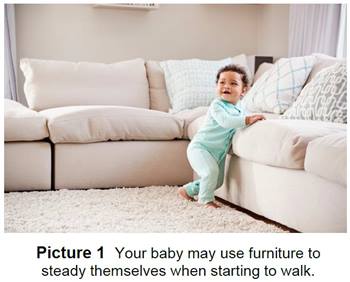Well-Baby Visits: 12 Months

Welcome to the 12-month visit! Your baby is now 1 year old! Today they will get 3 new vaccines, plus 2 or 3 booster shots. They will get these vaccines:
- Hepatitis A
- Varicella (chicken pox)
- MMR (mumps, measles, and rubella)
Talk to your baby's doctor or health care provider about any vaccine questions or concerns you have.
Growth and Development
Your baby's doctor or health care provider will go over their growth chart. At 12 months old, your baby should be able to:
- Stand while holding onto furniture.

- Walk along the furniture, or even walk alone (Picture 1).
- Start to make marks with a crayon on paper.
- Say words like "mama" and "dada" to the right person.
- Say one or more other words.
- Follow simple commands
- Start to use or pretend to use objects correctly. For example, they should know that people drink from a cup, fix their hair with a hairbrush, and talk into a phone.
Nutrition
At this age, your baby is exploring and trying different foods. They're probably eating mostly table foods. You need to know which foods your baby can and cannot have.
| They can: | They CANNOT: |
|
|
Safety
- Your child must right in a properly fitted car seat in the back seat until they're at least 2-years-old or until they reach the weight and height limit of their rear-facing seat.
- Do not leave your baby alone on a changing table or in a bathtub, car, bed, or sofa.
- Keep small objects like candy buttons, coins, and batteries out of reach.
- Put safety gates at the top and bottom of any stairs. Do not use walkers.
- Have a working smoke detect on every floor of your home.
- Keep cigarettes, lights, matches, alcohol, and medicines out of sight and reach.
- Do not leave heavy objects close to the edges of tables and countertops.
- Put away hot things (water, food, small appliances, etc.) and electrical cords.
- Put safety covers on electric outlets.
- Babies in child care get sick often. Viruses spread quickly in child care centers. Keep your baby home if they're sick. If they are not better after a few days, call their doctor.
HH-IV-110 | ©10/2014, revised 8/22 Nationwide Children’s Hospital
